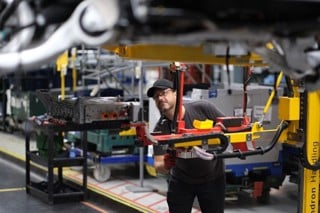A ‘simpler’ system to tax cars, based on vehicle weight and miles travelled, is being proposed as an ‘environmentally credible’ replacement for vehicle excise duty (VED).
Applying the polluter pays principle, the plan to reform VED is outlined in a study from Nick Molden and Felix Leach.
Molden, who is the CEO of emissions testing company, Emissions Analytics, and Leach, associate professor of engineering science at the University of Oxford, label the current system for VED as flawed, calling it a “mishmash of incentives and penalties”.
Former environment secretary and deputy PM, Michael Heseltine, said: “I welcome this contribution to the most important challenge of our time.”
Next year, ‘road tax’ will include electric vehicles (EVs) that are currently exempt from VED.
From April 2025, EVs will lose their VED exemption and will attract the next lowest first-year tax rate, which currently stands at £10.
Once an EV hits its second year on the road, owners will be required to pay the standard VED rate, which is currently £190 and is expected to increase with inflation from April 2025.
The new legislation will also hit buyers of EVs costing more than £40,000 with additional tax, and used EV buyers and hybrid buyers will also have to pay more.
However, Molden and Leach argue that there is a solution that is better for the environment, and simpler to administer and understand.
Molden explained: “Taxing a car on a combination of its weight and mileage offers a simple, potentially universal approach to pricing-in the environmental impact of cars while at the same time overcoming the objections to the current mishmash of incentives and penalties.”
The pair will be launching a new book - Critical Mass: The One Thing You Need to Know About Green Cars - later this month, which outlines the new car tax proposals.
Molden continued: “In our book, we offer an intuitive proof of why mass and distance are fundamental to designing a system to incentivise the purchase of ever-greener cars and this is contrasted with other flawed bases for judging environmental impact, such as measures of vehicle efficiency, including energy and fuel efficiency, as well as elements incorporated in the current system such as fuel type and laboratory carbon dioxide emissions.”
The pair outline ways in which the system can be adopted and show the types of cars likely to taxed lightly and those that will be more expensive to keep on the road. Broadly, smaller cars will be cheaper to tax.
Under Molden and Leach’s proposed system (taking the example of the UK), if an average car is 150kg lighter or does 1,000 fewer miles, the owner/operator would pay £100 less per year.
“Specific tax rates are proposed and compared to existing taxes to illustrate winners and losers – winners being small city cars and loser including high-mileage heavy cars and SUVs,” said Leach.
“The concept proposed is a reliable revenue-raiser at a time of widespread fiscal pressure and declining vehicle taxation. It could also be adopted rapidly and transitioning to it is easy.”
Molden added that deploying a single measure of a car’s environmental credentials to guide purchases and Government policy is the way forward, and the measure that takes account of approximately three-quarters of the environmental impact of a car is the car’s weight, and that metric correlates well with environmental damage.
He concluded: “Most people want to do the right thing environmentally when they are buying a car, but the information and choices are now too complex for any normal consumer to understand fully.
“The question was whether there is a simple, practical way to point the car buyer in the right environmental direction and allow governments to tax and subsidise the right things – and there is.”
























TimI - 20/11/2024 11:57
This approach seems designed specifically to target business and EV drivers. From an emissions point of view if doesn't recognise CO2 as a problem at all, nor does it give any benefit to more aerodynamic designs. Enforcement would also be challenging as low income drivers would just join the 100k already without insurance and tax.